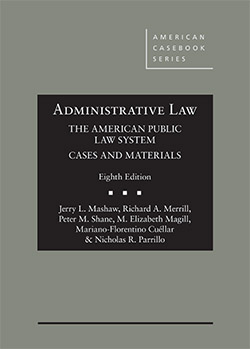- Home
- Administrative Law, The American Public Law System, Cases and Materials
Administrative Law, The American Public Law System, Cases and Materials
This title is a part of our CasebookPlus™ offering as ISBN 9781684672011. Learn more at
Faculty-CasebookPlus.com.
The Eighth Edition of this course book preserves the essential organization familiar to its many users, while eliminating material rarely taught in courses on Administrative Law. The volume thus affords a clear treatment of classic doctrine along with new material on cutting-edge issues such as the due process implications of algorithmic decisionmaking and the implications of digital privacy for the reach of agency subpoena power. Following an introduction to the history, institutional context, and theory of administrative law, students are exposed to four main topics: the political control of administration by Congress and the executive branch; agency processes for adjudication and rulemaking; government access to and required disclosure of information; and judicial remedies for official illegality. Doctrinal analysis is enriched by case studies of the law in action in particular contexts.
Imprint: West Academic Publishing
Series: American Casebook Series
Publication Date: 10/28/2019
Jerry L. Mashaw, Yale University Law School
Richard A. Merrill, University of Virginia School of Law
Peter M. Shane, New York University School of Law
M. Elizabeth Magill, University of Pennsylvania Carey Law School
Mariano-Florentino Cuéllar, Stanford Law School
Nicholas R. Parrillo, Yale University Law School
CasebookPlus™
This title is available in our CasebookPlus format. CasebookPlus provides support beyond your classroom lectures and materials by offering additional digital resources to you and your students. Anchored by faculty-authored formative self-assessments keyed to our most popular casebooks, CasebookPlus allows students to test their understanding of core concepts as they are learning them in class – on their own, outside of the classroom, with no extra work on your part. CasebookPlus combines three important elements:
- A new print or digital casebook
- Access to a downloadable eBook with the ability to highlight and add notes
- 12-month access to a digital Learning Library complete with:
- Chapter questions keyed to the casebook
- Black Letter Law questions (available in select subjects)
- Subject area review questions for end of semester use
Leading digital study aids, an outline starter, and audio lectures in select subjects
Students can still utilize CasebookPlus digital resources if they’ve purchased a used book or are renting their text by purchasing the Learning Library at westacademic.com.
With CasebookPlus, you can customize your students’ learning experience and monitor their performance. The quiz editor allows you to create your own custom quiz set, suppress specific quiz questions or quiz sets, and time-release quiz questions. Additionally, the flexible, customized reporting capability helps you evaluate your students’ understanding of the material and can also help your school demonstrate compliance with the new ABA Assessment and Learning Outcomes standards.
The Eighth Edition shortens or deletes textual material from earlier editions that teachers rarely cover in courses on Administrative Law, but introduces substantial new analysis and some new principal cases in key areas. For example, the adjudication chapter uses the Wisconsin Loomis case to explore the due process implications for criminal sentencing of using an automated risk-assessment program to predict recidivism. The rulemaking chapter features Texas v. United States, the Fifth Circuit opinion on the Obama-proposed DAPA program, to explore the line between agency guidance and substantive rulemaking. The chapter on government acquisition and disclosure of information uses Carpenter v. United States to raise the question whether the Supreme Court’s protective treatment of cell phone data implies that more than a showing of reasonableness on the part of the government should now be demanded in order to subpoena records in which an individual has a reasonable expectation of privacy.
The Eighth Edition also clearly reflects the increasing personal importance of presidents in administrative decisionmaking. The “availability of judicial review” chapter, for example, now devotes a section specifically to the reviewability of presidential action. Moreover, the volume helps to put into context the extraordinary number of public law controversies surrounding the administration of Donald J. Trump because of its aggressive deregulatory agenda and frequently unconventional approach to administrative process. These include headline-making disputes over presidential appointments, immigration, regulatory oversight, the status and treatment of adjudicatory personnel, and public participation (or the lack of it) in rulemaking. The Eighth Edition endeavors to highlight the most important of these controversies, while not losing focus on the so-far more enduring or at least less ephemeral features of our public law system.
Extensive textual notes also discuss the Supreme Court’s important 2019 decisions on the nondelegation doctrine (Gundy v. United States), the requirement of good-faith contemporary reasoning (Department of Commerce v. New York), and judicial review of agency interpretations of their own regulations (Kisor v. Wilkie).
Learn more about this series.
Access Denied
Law School Faculty - Sign in or Create an Account to access this content. Law faculty who have created an account can sign in after receiving email notification that registration has been approved. Email accountmanager@westacademic.com or call 800-313-9378 for assistance.
Other Higher Education Faculty who wish to access digital review copies or teaching resources should contact their West Academic Account Manager at college@westacademic.com or 800-360-9378.
Adopters Only
This content is intended for adopters only. Sign in or Create an Account to access this content. Law faculty who have created an account can sign in after receiving email notification that registration has been approved. If you are an adopter who is unable to access this content after signing in, contact your account manager for assistance at accountmanager@westacademic.com or call 800-313-9378 for assistance.
Access Denied
Sign in or Create an Account to access this content. Faculty who have created an account can sign in after receiving email notification that registration has been approved. Contact us for assistance.
Law School Faculty: email accountmanager@westacademic.com or call 800-313-9378.
Other Higher Education Faculty: email college@westacademic.com or 800-360-9378.
Access Denied
Higher education faculty who wish to view this document should contact their West Academic Account Manager at college@westacademic.com or 800-360-9378.

